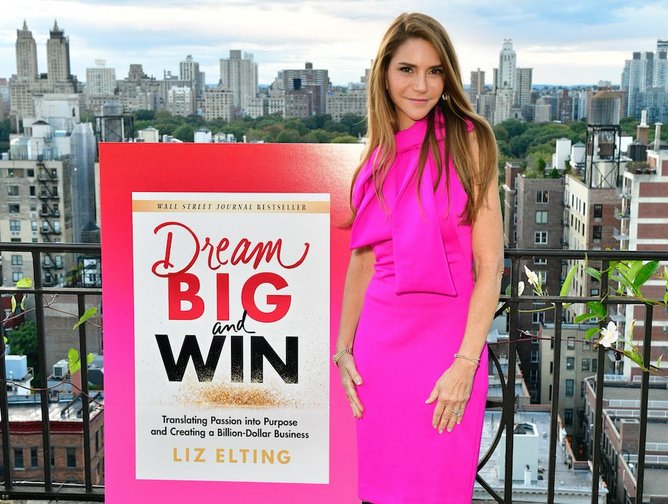Liz Elting – Driving Equality & Building Billion-$ Business

As far as book titles go, Liz Elting nailed it with her Wall Street Journal Bestseller Dream Big and Win: Translating Passion into Purpose and Creating a Billion-Dollar Business.
It all started when Elting founded a language services company, inspired by living in five countries, while still studying at NYU in 1992. By 2018, that company – TransPerfect – had billion-dollar revenues and offices in more than 100 cities worldwide.
From there, she went on to form the Elizabeth Elting Foundation, which is committed to ‘promoting progressive and feminist efforts to eradicate systemic barriers, promote public health and education, achieve workplace equality, rise beyond the glass ceiling, and open the doors to economic independence for those society has far too often shut out’.
If anyone can do, you’d back Elting. The recipient of many awards and accolades – including American Express' and Entrepreneur magazine's Woman of the Year, and one of Forbes’ Richest Self-Made Women since the list began – Elting is committed to the cause.
Here, Elting shares the secrets of her success, discusses the challenges she overcame, and explains her Foundation’s mission to help women take control of their own lives.

In starting and scaling TransPerfect, what was the biggest challenge you faced? And how did you overcome this?
Finding not only talented people, but the right people was a big challenge, especially at the early stages of scaling the company. From translators, to sales professionals, to leadership, I knew that we needed a team of the most highly skilled and talented people, but understanding what that actually required and how to assemble such a team was a learning experience.
What I realised was that relevant work experience and a solid resume are great, but they can only tell you so much about a candidate, and ultimately, what matters the most is whether the person is a good fit and is passionate about the company’s mission.
When we shifted our hiring approach to bringing on people who really believed in what we were doing and were aligned with the company’s goals and values, it changed everything.
Having the right clients, the right infrastructure, and critically, the right people is what got us to our first million and beyond.
While not easy, we eventually got into a groove with scaling. We took our time, vetted, and did our best to make sure every single hire was the right fit for the business. Sure, in doing so we lost some clients and employees along the way. Yet, for everything that was lost, we gained much more, and didn’t have to worry about wasting time on what simply wasn’t meant to be.
Most importantly, through it all, I learned from my mistakes and focused on being a strong leader for everyone who worked with me. I never stopped moving forward and trying to create a better future for myself and the company.
You say that innovation is an overrated route to success. Why is that, and how did you discover this in your own journey?
I wouldn’t say innovation is overrated – innovation is critical for entrepreneurs – what I would say is that invention, or only focusing on creating something brand new, is overrated.
You have to be able to build upon what’s come before you. Instead of starting from scratch or reinventing the wheel, entrepreneurship is about observing the industry or landscape you’re in, thoroughly understanding it, identifying problems, and then doing the real work of solving those problems.
Just because something already exists doesn’t mean it’s the best solution. Fred Smith didn’t invent mail delivery when he started FedEx – but he revolutionised it by making it faster and more efficient, addressing the unmet need for urgency.
As iconic as it is, the iPhone wasn’t the first popular smartphone, but it ushered in the now ubiquitous touch screen, revolutionising what a smartphone could be and who it was for.
I didn’t start from scratch either. There were already 10,000 translation companies out there. I built my company after working at another translation company and seeing glaring gaps and unmet client needs. I knew a better, more comprehensive service was possible, yet no one was offering that. So I started a company to fill those gaps and meet those needs myself.
In other words, I didn’t come up with a whole new idea, I took an existing one and made it better. So that’s really what I mean when I say inventing something entirely new is overrated and unnecessary.
I know firsthand that it’s possible to build a billion-dollar company by improving upon what already exists and solving problems in new ways.

How do you define authentic leadership and how did you, and do you still, deliver this?
True authenticity starts with honesty, and to me, nothing is more important than being honest with yourself and others. When you embrace who you are, what drives you, and what you value, you become a more effective leader.
My whole career has been about helping others connect, building bridges that span languages, cultures, and continents so that vastly different people can communicate and work together. You can’t do that without authenticity.
I still show up as my authentic self everyday. It empowers me to do my best work, it keeps me motivated and inspired, and it helps me do the same for others as a leader.
Embracing authenticity allows you to build powerful connections and meaningful relationships with those you work with. It’s magnetic. That’s why the best leaders have honed the ability to bring their true self to their work.
No matter what I’m doing or what I’m working on, being authentic and encouraging others to do the same has always been a strength.
Why is authentic leadership so important in business success?
Authenticity, honesty, and integrity allow you to trust in yourself, to trust in others, and crucially, to inspire others to put their trust in you as a leader. You can’t lead effectively without that trust. That’s especially true during turbulent times like today.
Building real, meaningful connections with people requires authenticity, and those connections are what will make or break you as a leader. Strong bonds and mutual trust are a superpower. Cultivating them is how you inspire your team to believe in your mission, to do their best work, to come together, and to be a part of the success of your company.
As many of us now work together across greater and greater distances, authenticity in leadership couldn’t be more important.
How would you describe your leadership style and how has that evolved?
As a leader, I believe you can only hope to get out what you put in. That means if you want your team to help your company succeed, then you also have to help them succeed. So I’ve always been the kind of leader who really leads from the trenches. I’d never ask my team to do something I wasn’t willing to do myself.
After all, your team aren’t tools; they’re your partners, your collaborators, your company’s advocates and ambassadors, so you have to show up and be those same things for them.
As any company scales though, the work of the business that you’re capable of doing yourself becomes less and less because you have to be able to do the work on the business. So over time, my leadership style became one of empowering others to solve problems and run with things in their own unique ways.
It wasn’t about having my team replicate what I would do, but empowering them to bring their own je ne sais quoi to the table. To identify problems, to come up with solutions, and to be a meaningful part of the direction and success of the company.
Why is it important to give employees a voice? How did you achieve this?
Simply put, you can’t have real collaboration if people don’t feel like they can speak their mind. Having a team in which people feel comfortable speaking up and disagreeing not only creates a more collaborative work environment, but it also creates a more successful company.
No one is right all the time, and no one knows everything – and that includes leadership. Having a team with a diverse range of experiences, expertise, and perspectives helps your company be more robust and fill all of those knowledge gaps. It’ll help you see things from multiple angles to better solve problems.
Your employees are the ones doing the day-to-day work, liaising with clients, and seeing all the intricate ins-and-outs of the business. They become familiar with aspects of the company that you will likely never see as a leader having to look at the bigger picture. Companies that listen to their teams are so much stronger and successful for it.
If your team feels empowered to express their opinions, even and especially when they don’t align with those of leadership, your company will benefit from different and often better perspectives and ideas.
This comes right back to the idea of creating an environment where your team can take ownership of their work. If they aren’t permitted to express themselves, how can you expect them to feel engaged with their work, much less take ownership of it.
I did this by incentivising an entrepreneurial mindset and by actively cultivating collaborative dialogues throughout my company (e.g., utilising regular employee surveys, creating channels of communication for idea sharing, taking the time for one-on-one meetings, and having brainstorms where everyone gets the chance to share their perspectives).
One place I loved to start was asking employees, “What would you do differently if you owned the company?”
What do you see as the biggest two mistakes entrepreneurs make?
The first is never translating your big idea into the actions necessary to make it actually happen. A lot of people talk about big, ambitious ideas, maybe they want to create a world-changing app or new technology that launches an incredibly successful company.
Yet, what so many don’t do is have concrete, actionable goals with deadlines, and so their big idea never comes to fruition.
So often, people ask me what the silver bullet is for building a successful company from the ground up, and my answer is always actions driven by goals with deadlines over a sustained period of time.
The work of building a company comes down to all the day-to-day, laborious actions it takes to build a company. It may not be as romantic as what you envisioned you’d be doing as an entrepreneur, but it’s that unglamorous work that makes the dream possible.
The other is getting comfortable with your success and resting on your laurels. If you aren’t growing and innovating as a business, you're dying. Success isn’t a given, it’s all about setting goals and then doing the work to achieve them. Once you can cross one goal off the list, it’s on to the next one.
Leaders need to be constantly raising the bar and building on their success, or else their business will stagnate, and as I alway say, stagnancy is the death of a business.
How important is risk-taking?
Simply put, you cannot succeed without taking risks. If you play it safe, if you always do what’s comfortable and easy, you won’t stretch and grow and fulfill your potential.
If you want to pursue your passion and accomplish your dreams, you have to be bold and take risks. There is no room for success without taking risks. Avoiding risks will keep you right where you already are.
Getting where you want to be requires going out of your comfort zone and doing what’s hard and even scary. If you aren’t open to change, and if you aren’t comfortable with making mistakes, then you won’t ever push yourself hard enough to really succeed.
You have to be bold and take risks if you want to pursue your passion, dream big, and win.
What inspired your move into philanthropy? And what do you and don’t you miss about running a billion-dollar business?
Philanthropy has been a part of my life through much of my career. Stagnancy doesn’t just kill businesses, it kills careers too. So after over a quarter of a century running my company, I was ready to open a new chapter and dive all in on my philanthropy and advocacy through my foundation.
It’s less of a move and more of a natural evolution of my life’s work. I like being a problem solver, connecting people, and bridging gaps from where we are today to what we can accomplish in the future. And I have always been driven by the firm belief that everyone should have the opportunity to fulfill their potential, build success, and create the life they want.
Just as when I founded my company all the way back in 1992, I founded The Elizabeth Elting Foundation with the overarching goal of bridging gaps and building solutions – this time, to some of the most pressing problems our world is facing – so that everyone has the ability to fulfill their highest potential.
My company was a big part of me. I was in my 20s when I started it, and in many ways, it felt like my baby. But I’ve grown and changed so much since then.
What I miss most are the brilliant people who made my company what it is. But everything else I loved about running a business – solving problems, working toward a common goal, helping people connect – are all things I still get to do through my foundation.
It’s extremely fulfilling work and I’m immensely grateful to play a role in it.
Discover the Elizabeth Elting Foundation.






